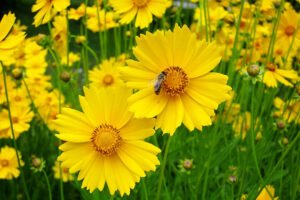In 2021 BGC partnered with one of our members who was a “ranger” for the David Suzuki Butterflyway Project. This volunteer-led movement aims to grow more habitat for bees and butterflies in neighborhoods throughout Canada by encouraging the planting of native plants, shrubs or trees.
There is a global decline in wild pollinators which is very concerning but by planting with pollinators in mind, using native plants, we can all do our part to help them recover and thrive. This decline is due to threats such as: habitat loss, pesticide exposure and climate change…a serious problem that requires immediate action to ensure the protection of the natural environment and Canada’s food system.
We encourage all members and readers to support this project through the choices you make for your gardens.
Plant Suggestions
The Butterflyway Project’s goal is to establish habitat for local bees and butterflies in communities throughout the country. ![]()
Please consider adding more native plants to your garden. Native plants provide shelter and food for wildlife and support pollinators. Native plants attract a variety of birds, pollinators, and other wildlife by providing diverse habitats and food sources.
Three tips to support pollinators:
![]()
- Growing native plants that bloom throughout the season is the most significant action you can take to support pollinators. Use the Latin name when buying plants.
- Avoid using pesticides, especially insecticides.
- Spread the word!
Here are some suggested perennials that support our pollinators and have been successful in our area. Buy or ask a neighbour to share. Go slowly – one plant can make a difference!
| NAME | LATIN NAME | CONDITIONS |
| Early Blooms | ||
| Golden Alexander | Zizia aurea | Full sun – Part Sun |
| Butterfly Weed | Asclepias tuberosa | Full sun |
| Lance-leaved Coreopsis | Coreopsis lanceolata | Full sun |
| Western Bleeding Heart | Dicentra formosa | Filtered sun – Full shade |
| Jacob’s Ladder | Polemonium reptans | Shade – Filtered light |
| Wild Geranium | Geranium maculatum | Part shade – Sun |
| Mid – Late Blooms | ||
| Black-Eyed Susan | Rudbeckia hirta | Full sun – Part sun |
| Blazing Star | Liatris spitica | Full sun |
| Purple Cone Flower | Echinacea purpurea | Full sun – Part sun |
| Cardinal Flower | Lobelia cardinalis | Full sun – Part shade |
| Swamp Milkweed | Asclepias incarnata | Full sun – Part shade |
| Bee Balm | Monarda didyama | Part shade – Filtered sun |
| Late Blooms | ||
| New England Aster | Symphyotrichum novae-angliae | Full sun – Part sun |
| Spotted Joe-Pye Weed | Eutrochium maculatum | Full sun – Filtered sun |
| Zig-zag Goldenrod | Solidago flexcaulis | Shade to Part shade |
| Evening Primrose | Oenothera | Full sun – Part shade |
| False Sunflower | Heliopsis helianthoides | Full sun – Part shade |
| Boneset | Eupatorium perfoliatum | Full sun – Part sun |
See these perennials:
Pollinator Garden Tips
Create a new garden or add native plants to an existing garden. There is no minimum or maximum size (Small space? Plant your native plants on a balcony, along a fence or in contaioners)
Plants:
- Include locally sourced native plants & shrubs
- Choose species that bloom at different times from spring to fall
![]()
- Provide some host plants for butterflies (plants for laying eggs & feeding caterpillars)
- Include plants that provide shelter from predators & the elements (e.g., big bluestem, switchgrass)
Flowers:
- Select flowers with a single ring of petals around a central disc

- Colours that attract bees: bright white, yellow, purple & blue
- Colours that attract butterflies: bright colours including purple & red
Layout:
- Plant each species in clumps of 3 to 5 plants
- Include plants of various heights
Other features:
- Shallow water source with landing pads or perches (e.g., stones, water plants)
- Flat stones for butterflies to rest & bask in the sun
![]()
- Bare patch of ground (free of mulch or ground cover) for native ground-nesting bees
- Avoid use of pesticides, herbicides and insecticides
Reference Links
https://davidsuzuki.org/take-action/act-locally/butterflyway/#video-single-4
https://espacepourlavie.ca/en/butterfly-gardening
Plant Databases to Reference:
https://can-plant.ca/ecommerce/
https://cwf-fcf.org/en/resources/encyclopedias/native-plant-encyclopedia/
https://www.wildflower.org/plants/
Guide for Selecting Plants for Pollinators in Quebec:
https://www.pollinator.org/pollinator.org/assets/generalFiles/StLawrence-2016.pdf
Butterflyway Webinar on Native Plant Gardening:
Native Plant Gardening Webinar